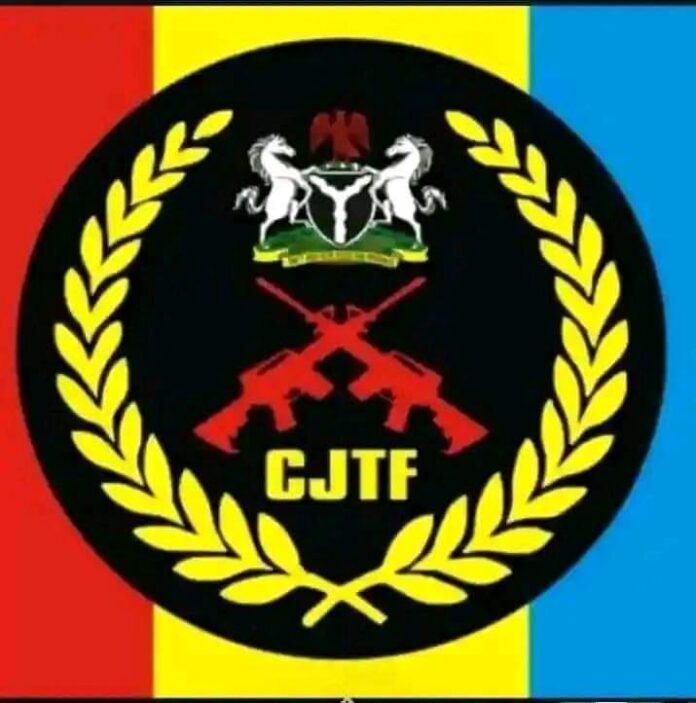The Civilian Joint Task Force (CJTF) says it has the capacity to eliminate banditry and drastically reduce insecurity across Nigeria within one year if the Federal Government provides advanced technology and stronger operational support. The group made the claim at an event in Abuja over the weekend, where its national chairman, Kailani Muhammad, received a certificate of partnership as Chairman of the West African Joint Task Force (JTF).
The certificate was presented by Charles Omini, a special envoy and ambassador to West Africa for the International Human Rights Protection Service/Forum. The event focused on security collaboration and the growing need for the use of technology in fighting violent crime.
Speaking after the ceremony, Muhammad said the CJTF already has intelligence on the locations and hideouts of many criminal groups, including bandits and kidnapping networks, but lacks the tools to act effectively.
“If actually we mean business, we know, even in the states where all these things are happening, we know their locations, we know where they are,” he said. He argued that the group’s knowledge of local communities and difficult terrains gives it an advantage that could speed up counter-banditry operations.
Muhammad urged President Bola Tinubu to give all service chiefs a one-year deadline to work alongside the CJTF to end insecurity nationwide. He said the security chiefs should sign an undertaking to ensure they meet this target, and if they fail, they should be asked to resign.
“We are calling on Mr President to give all the security chiefs a timeline of one year,” he said. “They should sign an undertaking, and in the next one year, in collaboration, they will work with us to make sure that we wipe out insecurity in Nigeria. If they don’t do it, they should resign.”
The CJTF chairman stressed that new security technology is crucial if Nigeria hopes to win the war against banditry. He asked the Federal Government to equip the group with CCTV surveillance systems, wide-area monitoring tools, and artificial intelligence (AI) technologies that can identify criminal movements across borders.
He also expressed concern about Nigeria’s extensive, poorly monitored borders. According to him, the country has about 2,000 entry and exit routes, many of which are used by armed groups to enter or escape the country unnoticed.
“If the government can help us, we need to put CCTV as it’s obtained in Mexico now and America,” he said. “These should be positioned 100 kilometres where you see the influx of these hoodlums. We have AI now.”
His comments reflect growing calls for modern security tools to complement manpower in the fight against terrorism, banditry, kidnapping, and illegal arms smuggling.
The Civilian Joint Task Force emerged in 2013 at the height of Boko Haram’s attacks in Borno State. It began as a volunteer movement made up of young people who helped the military identify insurgents hiding in local communities. Over time, the CJTF became a recognised and valuable support group in the North-East, assisting security forces with intelligence gathering and patrols.
While the CJTF has been praised for helping reduce Boko Haram’s influence in many areas, it has also faced concerns from rights groups about alleged abuses. Despite this, many communities continue to see the group as an important partner in local security.
As banditry and kidnapping spread to the North-West, North-Central, and even parts of the South, the CJTF has tried to position itself as a national security partner capable of supporting the fight against violent crime.
Speaking at the event, Ambassador Charles Omini also emphasised the importance of cooperation among security agencies. He said Nigeria’s security challenges—ranging from terrorism and banditry to kidnapping and oil theft—are too complex for any single group or agency to solve alone.
“I call on the security heads at all levels to come up with very strong strategic collaborations and partnerships with the relevant agencies and organisations,” Omini said.
He encouraged all security institutions to move away from old methods and embrace modern technology. “We’re in a global and digital world,” he said. “I appeal to security agencies to engage more of advanced technology to combat these challenges.”
In addition to calling for better equipment and cooperation, Omini also appealed to armed groups to drop their weapons and stop terrorising Nigerian communities.
“Those who are carrying arms, who are kidnapping, for how long are they going to do this?” he asked. “We are appealing to them, these killings and kidnapping must stop. Enough is enough.”
His statement reflects a growing belief that military force alone cannot end Nigeria’s security problems. Many experts say a combination of dialogue, community engagement, tougher border control, and modern technology will be necessary to achieve long-term peace.
The CJTF’s bold claim that it can wipe out banditry in one year has sparked conversations about the role of community-based security groups and how much support they should receive from the Federal Government. While some Nigerians welcome any strategy that offers hope, others believe the insecurity crisis is more complicated than a one-year timeline.

